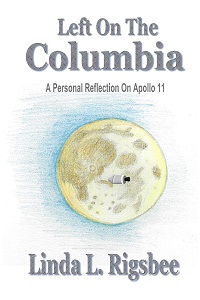The capsule containing the crew of the Apollo 11 moon mission splashed back from space on my 20th birthday. It had been an historic week. On Sunday, July 20, 1969 I watched on our black and white television as the Lunar Module, Eagle, landed with the first men to walk on the surface of the moon. The static-interrupted voice of Neil Armstrong calmly said; “The Eagle has landed.” When he left the craft and stepped on the moon surface, he made the statement that found its place in history books: “That’s one small step for man; one giant leap for mankind.” We watched the fuzzy screen as Buzz Aldrin joined him and they conducted their mission.
It was an event that captured the attention of the world. In addition to being the fulfillment of a promise made by President Kennedy, it was a positive relief from the news about the Vietnam War and protests. In the last year, we had been shocked by the assassinations of Martin Luther King, Jr. and Robert Kennedy. We were ready for some good news.
Today, on my 70th birthday, I contemplate the event fifty years later. There were three men on the Apollo 11 mission. Michael Collins had been left on the Columbia. I’m sure his participation was acknowledged at the time, but it appears his importance has been lost in history. In fact, his example may be more important in another way now than it was then.
Collins was the son of a career US Army Officer and a graduate of the United States Military Academy at West point with a Bachelor of Science degree at the age of 22. He joined the United States Air Force and in the next eight years, received training at bases in Mississippi, Texas, Nevada, California and France. In the 22 weeks he was at Nellis Air Force Base in Nevada, flying F86 Saber fighters, eleven pilots were killed in accidents. Apparently, he was undaunted. He applied for and was accepted by the US Air Force Experimental Flight test pilot school at Edwards air force base at age 30.
As I read about his achievements before and during the Apollo 11 mission, I began to think about the fact that he is only eighteen years older than me and yet he has done so much more with his life. At 62, I retired to take care of my husband and at 88, he is still contributing.
I’m sure that isn’t the message he would like any of us to take away from his lifetime accomplishments. No doubt, he would like to be as much an inspiration to us as John Glenn was to him. The more I thought about it, the more I realized that all those accomplishments were specific to his dreams, not mine. It occurred to me that his greatest influence may have been how he responded to being left on the Columbia while Buzz Aldrin and Neil Armstrong were capturing the attention of the world on the surface of the moon.
Michael Collins was the first person to perform two spacewalks in the same mission. He completed two successful space flight operations – Gemini 10 and Apollo 11. Successful doesn’t mean they had no complications. As in all aspects of life, errors and complications can be learning experiences. It all depends on our outlook and how we respond.
On the Apollo 11 mission, Collins was left alone on the Columbia. He had the job of inspecting the Eagle as it left the Columbia to ensure there was no damage to it and that the landing gear was correctly deployed before heading for the surface of the moon. He had to prepare the Columbia for their return. In his autobiography, Collins wrote “this venture has been structured for three men, and I consider my third to be as necessary as either of the other two.”
The Columbia orbited the moon 30 times during the mission. When he reached the back side of the moon each time, he was out of radio contact with earth for 48 minutes. Collins said he was never lonely in his time without the other two astronauts, and described the 48 minutes out of contact as “relaxing.” Perhaps he was joking about not having to report to Mission Control. In the mission log, someone wrote “Not since Adam, has any human known such solitude.” Solitude, to Collins, was peacefulness.
As I thought about different aspects of his life, I could see a similarity between my life and that of Collins. He didn’t seek, or even desire fame. After the Apollo 11 mission, he retired from the space program, making his family highest priority. He became a writer.
The lesson I think Collins left for each of us is that we are an equally important part of a global team. Each of us can make a difference when we participate. It isn’t necessary that we are recognized by others for our part, but that we recognize our own contribution. One person’s success cannot be compared to another’s, because we are different people with different goals.
Left On The Columbia
by Linda L. Rigsbee
Please sign the guest book and rate the story. Your comments are always welcome and your information is appreciated, but not required.

Non-Fiction - Memoir

